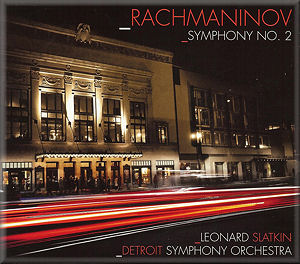 |
 |
|


alternatively
CD: Crotchet AmazonUK AmazonUS
Download: Classicsonline
|
Sergei RACHMANINOV (1873-1943)
Symphony No. 2 in E minor, Op. 27 (1908) [54:05]
Vocalise, Op. 34, No. 14 (1915) [6:38]
 Detroit Symphony Orchestra/Leonard Slatkin
Detroit Symphony Orchestra/Leonard Slatkin
rec. Orchestra Hall, Detroit, USA, 24–27 September 2009
 NAXOS 8.572458 [60:43]
NAXOS 8.572458 [60:43] 
|
|
|
A successful performance of almost any major Rachmaninov work
will leave the listener thinking that the music is better than
it really is. In the case of the E minor Symphony, the performers
must somehow disguise the episodic nature of each of the movements,
the work being, in effect, a series of glorious moments connected
by frequently rather contrived transitions. Something has to
be done, too, about those passages where the level of inspiration
falls below the line - the middle section of the finale, for
example. The success of the whole work rests on melody. It is
full of big tunes, ardent and surging, but these are constructed
for the most part using stepwise motion, with rising sequences
employed to increase tension. If we are not to think this artificial,
a no-holds-barred attitude has to be adopted.
Leonard Slatkin’s way with these big tunes, almost always played
by the violins or massed strings, is to keep cool and bring
out the counter-melodies. The trouble is that these counter-melodies,
played by the horns or other members of the wind band, are often
little more than undistinguished figuration designed to enrich
the harmony and texture. The second theme of the first movement
gets this treatment. It is also given very slowly, both in relation
to the main tempo of the movement and to the composer’s metronome
mark. In fact Slatkin, like many conductors, is quite cavalier
about the composer’s markings throughout the performance. How
revealing it would be, just once, to hear a Rachmaninov performance
wherein every crescendo or tempo change began exactly at the
point indicated by the composer! There are a few odd balances
in the development section of this same movement, and that after
a slow introduction which is grim and menacing where dark melancholy
is what we usually expect. Rachmaninov marked the exposition
to be repeated, but Slatkin ignores this; there can be no argument,
in the early twentieth century, that this was merely a convention.
Perhaps he was worried about the audience’s attention span,
because – and there is no indication anywhere of this – this
is a live recording. The audience is in fact commendably quiet
until the inevitable final cheers.
The second movement is taken very fast, to the point of sounding
rushed and breathless, especially the middle section with its
short brass band interlude. The principal clarinettist plays
the long solo in the slow movement beautifully, but many will
wish the instrument had been more prominent in the overall texture.
Subsidiary parts are again brought out when this theme returns
towards the end of the movement. The finale is brilliantly played,
but there is little feeling that the final pages represent the
culmination of any kind of symphonic journey, and not much excitement
is generated.
Listening to this performance, one doesn’t get the feeling that
the conductor is totally convinced by the work, still less that
he loves it. Gennadi Rozhdestvensky though, conducting the London
Symphony Orchestra in 1988 (reissued
on the super-budget label Regis) plays the work for all
it is worth, perhaps for more than it is worth. He leaves one
convinced that it is a masterpiece. He caresses and cajoles,
and his control of phrasing, pulse and texture is immensely
subtle. He consistently finds the right tempo – taking significantly
more time in all four movements than Slatkin – and the music
always has time to breathe, even in the faster passages.
Another fine performance is, perhaps surprisingly, that by James
Loughran and the Hallé Orchestra from 1973, available in EMI’s
Classics for Pleasure series (5755652). The Free Trade Hall
recording is inferior to that for either Rozhdestvensky or Slatkin,
with considerably less orchestral detail, and you don’t get
the exposition repeat. But the conductor’s view of the piece
is totally convincing and the orchestra play like heroes. Much
as I admire both these performances, the finest on my shelves,
and perhaps the finest I have ever heard, is neither of these,
but one recorded in 1994 and issued free with the BBC Music
Magazine (BBC MM127, 1994, Vol. III No. 3). The BBC Philharmonic
is conducted by the late Edward Downes. It is a reading of extraordinary
conviction and stature, and should certainly be made more widely
available.
The orchestral playing on Slatkin’s Detroit performance is brilliant
throughout, but there is a sheen to the sound which is far removed
from anything Russian. The reading is cool and efficient, missing
out on much of the tenderness, melancholy and excitement which
other interpreters have found in the work. Many finer performances
are available – one shouldn’t forget Previn’s
reading on EMI – but for my money few are as fine as Rozhdestvensky’s.
You won’t get any extra music – though Slatkin’s performance
of the lovely Vocalise is hardly going to make any real
difference – but you will want to stand and cheer at the end,
probably even more loudly than the Detroit audience does.
William Hedley
|
|












